- Home
- Charles L. Grant
[Oxrun Station] The Orchard Page 16
[Oxrun Station] The Orchard Read online
Page 16
"The monsters," the boy whispered.
Michael couldn't help it; he looked over his shoulder.
There was no one in the hall.
He spat the hanger out, grimaced at the taste still lingering in his mouth, and sat on the edge of his bed, beckoning until the boy wheeled himself over.
"Now what's all this about monsters?" he said, trying to remain as serious as Rory looked. "Am I in for another one of your crazy stories?"
The boy shook his head, wouldn't look up. "Where do they come from?" A small voice, a night voice just out of a nightmare.
Michael shifted awkwardly until he could swing his cast onto the mattress, foot on the pillow, and tuck his other leg underneath: Resting on his elbow then, he was near to eye level and tried not to listen to the silence he heard.
"In here," he said, tapping a finger to his forehead.
Rory blinked. "I don't think so."
"Sure they do, pal. You know what imagination is, right? God, you ought to, with all that stuff you've been handing out."
Rory nodded, reluctantly, his eyes half closed as if fighting a headache.
"Well, that's where they come from. Your imagination. Some guy, see, gets scared of a shadow and they turn it into some really creepy thing that hides under the bed, or in the closet, or under the porch. But it isn't real because you made it up. So you stick your tongue out at it and it goes away. Or you turn on the light. Something like that."
Again the child's voice: "Are you sure?"
He looked around the room, wishing the kid's parents would magically pop out of the bathroom and explain how to deal with something like this. Of course he was sure, but how do you explain it to someone who believes?
"Yes," he said firmly. "Imagination is what makes movies and books and comics and television shows. It's what makes my job, sometimes, when I have to imagine what this guy or that guy was thinking when he did something. It helps to clear away all the garbage and get me what I want." Easy, he thought then; easy, you're lecturing. "See, I have to look for facts, Rory. And sometimes my imagination helps me find them."
"Don't . . . don't you ever get in trouble?"
He laughed, knowing the boy would never understand. "You, my friend, have just hit the nail right on the head. Trouble? I have been in such trouble, you wouldn't believe it." He leaned forward and reached out to tap the boy's knee. "And you know why I got into trouble, my boy? Because I let my imagination run away with me."
Rory looked to his pillow, looked at Michael sideways, and wheeled the chair back to the window. He got up, took off his robe, and climbed into bed, pulling the thin blanket up to his chin. "The monsters?"
"You mean the ones downstairs or-"
"Yes."
"Imagination."
Rory put a hand on his bandage, winced, and nodded.
Michael waited, then maneuvered himself under his own covers, sitting under the tiny light that barely reached to his feet. The rest of the room was dark. He could hear Rory breathing, every so often shifting his legs across the sheets.
"Hey, pal?"
"What?"
Michael sat up to see over the bedtable. "Where did you see these monsters of yours?"
There was no response for several seconds, and Michael thought he'd fallen asleep. Then he pulled one arm from under the blanket and pointed to the floor.
All night.
Whispering.
And the shadows of dreams.
The next morning Michael screamed.
The moment he opened his eyes it was there, working out of his throat from the fire rushing through his legs, from the burning on his palms, from the bars that had been thrust through one shoulder to the other. The effort to keep silent spun the scream into a groan, and he grabbed for the call button on the wire by his head.
Holding himself rigid. Keeping his eyes closed. Nodding when he heard Janey asking sadly about the pain.
"You're just a big kid, you know that, Mike?"
Janey. Lovely Janey.
"Now be a good boy and wait, and I'll see if Doctor Player will let you have something to take care of it."
Shit on growing up, he thought, if it means J can't cry.
"Janey?"
Slipping a hand behind his head a few minutes later, holding a paper cup to his lips, putting a pill on his tongue, waiting while she stroked his chest until the medicine was down. Whispering something in his ear and kissing his cheek, shifting and drawing the curtain around him.
Drifting.
Dozing.
Waking sometime past noon to see a pair of white coats standing by Rory's empty bed, looking at the boy's chart, looking up at him and telling him with their eyes he'd best rest, go back to sleep. Carolyn bent over him, brushed back his hair, and whispered something in his ear.
"Carolyn?"
"Hush. Go to sleep."
"Carolyn, my head hurts."
"It's all right. When you wake up, everything will be fine."
Drifting.
Dozing.
The telephone waking him, the ringing cut off before he could reach the receiver. Turning his head, seeing Rory motionless, asleep, a fresh bandage now covering half his skull along the left side, wisps and ferns of red hair poking into the air.
Story, he thought as he drifted off again; story, there's a story, but he couldn't open his mouth.
Waking a third time to damn his impatience. If he hadn't been so anxious to walk a hundred miles the day before, he wouldn't be stuck now, gripping his right thigh to corral the pain below his waist, taking deep breaths as the medicine played with his vision and filled his mouth with damp cotton.
"Hey, Rory, am I dead or what?" he said with a laugh when the pain subsided and he could think again. "God, I think I could drink a ton of water without even floating."
There was no answer.
"Y'know, it feels like someone put dynamite in my head. I think if I sneeze, I'm gonna blow my brains out."
Still no answer, and he passed a hand over his face, over his chest, and realized that the room was in twilight, the door partially closed. The sun was gone, the blinds drawn to the sill, and little more than a lighter dark slipped in from the hall.
Swallowing, he looked over to see if the boy was asleep; rubbing his eyes, he pushed up on his elbows.
The bed was empty, sheets and pillow gone, blanket folded at the foot. The chart wasn't on its hook.
A sympathetic sigh no one heard. The boy hadn't gone home; they must have moved him again. And from the way whatever was wrong with his ear was progressing, it was probably into a private room on the building's other side, or down to intensive care, where he could be monitored more closely.
He shook his head slowly, and regretted it immediately when the headache flared and made him gasp, and sent orange pinwheels through his eyes.
"Oh, brother," he gasped. "Oh, god, where's the aspirin?"
Not moving until it passed, looking again at Rory's bed and hating to think of the kid with tubes and wires and all those freckles fading to nothing. That sort of thing wasn't fair, not when you were just a boy and couldn't protect yourself.
His stomach growled. Mindful of the explosion he could bring on if he moved fast, he reached for the basket of fruit Cora had brought, and yanked his hand back. It was empty, and the apple he'd taken the bite from was still on the table, shriveled and brown, with a fly walking on its skin.
Jesus, he thought, grimacing in distaste and working his arms until he was upright. He reached down to his left and picked up the small trash can, held it against the table, and brushed the apple off, and the basket. Voracious orderlies, he decided, or a nurse, maybe Rory's parents or doctors. It didn't make any difference; he was still hungry, and he used the call button in hopes he could wheedle some food from the night shift.
A minute later he tried again.
A minute after that he threw the covers aside and reached for his crutches. He had to use the bathroom anyway, and while he was up he could look i
nto the hall and maybe flag someone down.
His legs wobbled and held him, the headache didn't return but remained a distant throbbing, like the throbbing under the cast, and when he was at the door, feeling little better, he looked toward the nurses' station and saw it deserted. After a curse for rotten luck, he hopped backward on his good leg, perched on the metal footboard, and massaged his thighs. An emergency somewhere. He would have to wait and try again.
And as he did, he thought of Rory, wondering what it would be like to have a boy of his own. One to watch, to take care of, to lie to and tell stories to and mark his own years by the birthdays he had. How much of it was romance, and how much was plain work? He guessed that, with Rory, a lot of it was listening to tall tales and excuses and doing your best not to laugh when you were supposed to be angry.
He leaned forward, saw no one, and made his way to the bedtable, picked up the phone's receiver, and smiled when Marc answered, laughed when the editor demanded he stop goldbricking and get his ass back to work.
"But I have good news," Marc said. "The Jasper boy is back."
"What?"
"Right. They found him a few hours ago, up in Portland. Apparently the kidnappers got cold feet, jammed him in a sack, and dumped him in someone's backyard. He's okay, just scared as hell. Jasper's giving the family that found him something like fifteen grand and a new car."
"Damn," he said. "There goes my Pulitzer."
Feeling the first sting of another headache, and looking over his shoulder when he heard a scratching in the hall.
"Mike, I have an idea. It won't be a Pulitzer, but it might do you some good. Just hear me out before you say yes or no, and don't jump to conclusions."
A distant scratching, a nail drawn along the floor from the bottom of an old push broom, a child walking with a stick he held to the wall.
Michael pulled the receiver away from his ear, listened harder, leaned back in order to peer through the door.
Marc kept on talking, almost urgently now.
The scratching, louder. And no one complaining.
"Damnit, Mike, are you listening to me?''
The scratching stopped.
Making faces and rubbing his temples as the headache grew stronger.
"Kolle, are you there?"
Footsteps now, from the other direction, heavy and uneven, a man on a bad leg, or a man on a false one. Step-tap, a deep breath; step-tap, and a sigh.
"Michael!"
"I'm here, I'm here," he said, cupping his hand around the mouthpiece, staring at the door.
"Well, did you hear anything I said?"
Step-tap, a deep breath; step-tap, and a moan.
"Jesus Christ," Michael whispered.
"Mike, what the hell's going on?" Clayton demanded. "Did they give you something? A sedative?"
"Marc, I need to get hold of Cora, okay? She didn't give me her home number and I need her here, now."
Step-tap, and silence.
The nightwind soughing in the pines.
He was watching a dim glow grow brighter up by the front of the building when something Clayton said made him turn from the door. "What? Say that again?" And he could hear strained patience in a long exhalation.
"I said, 'Cora who?' "
"Cora who? C'mon, Marc. Cora from the paper, the kid, who else?" The cord wrapped around a finger, the base sliding along the table. "She said ... she told me you said she was supposed to work with me."
"Mike, I . . ." Clayton stopped and cleared his throat. "Mike, I don't have any Cora working for me. Never did."
"You're kidding."
The room brightened, whitely.
"In fact, the only Cora I know is Cora Keane."
"Then it must have been her."
"Not likely, Mike. She committed suicide after her sister disappeared."
"Now wait a minute," he said. "Wait a minute, let me get this straight. Are you telling me-"
The dial tone stopped him, and stopped completely when he tried to regain the connection. He didn't try a second time because the light grew even brighter, slamming shadows against the back wall, painting the window a dead black. The crutches felt chilled, but he flexed his fingers as he moved, to the end of the bed, to the edge of the door, looking out after swallowing and licking his lips, closing his eyes against the pain that swelled from his nape and filled his skull with a roaring.
Breathe, he ordered sternly; breathe, it'll pass.
And when it did, he looked out again.
There was no one to his left, no one to his right, everything touched and washed by the same source-less white.
He told himself not to worry, that something was wrong with the power, like bulbs that flare up just before they blow out, and all he had to do was sit down and wait and someone would be around to let him know what was going on.
An elevator opened.
A dark figure stepped out, paused, and walked away.
He didn't bother to squint or shade his eyes because he recognized Janey immediately from her walk, the swing of her hips, the way her winged cap sat on her hair as if ready to fly away. Relieved and somewhat angry, he stumped out of the room and called her name, half turning his head against the glare and calling again when she ignored him. Stopping when she disappeared into the nurses' station, he heard something coming toward him, quickly on his right.
Step-tap, and sighing.
Black and still a part of the light, a fragment broken off and moving, the white glow around it as if turned to fog, forming,, re-forming, erasing it and bringing it back, this time much smaller, and the step-tap was a padding, and the sighing was a growl.
He started to run and almost fell, blinked sweat from his eyes, and forced himself to use the gait of crutches and cast. Hitting the elevator call button as he passed, both up and down, then swinging into the station where Janey was sitting.
"You're supposed to be in bed," she said.
"Janey, what the ..." He looked around in dumb amazement, looked back for an answer, and saw her roll the chair away from the report she was writing.
"Why aren't you in bed?" she asked, shaking a naughty-boy finger as though she were his mother.
"Janey, for god's sake, come on, huh?"
She rose and put her hands on her hips. "I won't tell you again, you hear? I've had enough."
It's all right, he thought, when he felt the fear touch him. It's ail right; she's just tired and you're still a bit punchy.
"Janey-"
"I think . . . Miss Clark, to you."
"-just tell me what the hell is going on? What's that thing out there? I mean, what-"
He was babbling, and he clamped his jaws tightly, closed his eyes until they stung, knowing he sounded like a madman, the last thing he wanted when Janey herself sounded mad.
Then the headache returned in such a rush he gasped and nearly fell. "Janey, it's killing me."
"I know, poor thing. It must be terrible."
"Look, can you give me something? Something to help me? Jesus, it hurts!"
A patient sigh while the pain expanded, staggering him, throwing him up against the counter's rounded corner. "Oh, Jesus, it's killing me, Janey!" The heels of his hands step-tap pushing against his temples, grinding at the fire step-tap while the muscles in his neck bulged to reddened cords.
"Michael?"
"She's dead," he said. Babbling; damnit, stop babbling. "She's dead."
"Dead? Who's dead, Michael?"
"Cora. God, didn't you know that? Cora's dead, I saw her and she gave me this apple and I ate it and she's dead, she was always dead, Janey, and Jesus Christ it hurts so bad!"
"Michael?"
His eyes opened.
"Michael, do you love me?"
Something moved in the white hall.
"Janey, please, you've got to call somebody. Call the security guards, the police. There's-"
She whirled away from him, her cap spinning to the floor, and he told himself, it's only the headache, only the drugs,
when he saw her eyebrows thicken, and darken, and meet over her nose while her lips pulled back in a low steady hissing and her teeth bared and sharpened while her uniform turned black.
He yelled, stumbled back, and fell against the wall. Yelled again when she lashed the chair to one side and lunged over the counter, to fall on the dark creature that sprang out of the white and met her in midflight.
"Janey!" Almost weeping. "Jesus God, Janey!"
Too afraid to move, one palm pressed against the tile, he held the crutches tightly to his chest and sidled to the right until he was stopped by the corner.
Listening to the snarling that sounded more like thunder, the screeching that echoed in gunshots from the walls and down the hall; seeing flashes of black limbs coiling madly over black, and flashes of red that hung in the light, spattered on the counter, landed on his arm and dripped to his fingers until he wiped them off on his nightclothes with a shudder and a moan.
Listening to the sound that began as a moan and rose to a scream that made him cover his ears and press his face against the wall and kick at the baseboard with the side of his cast until there was just a silence laced only with his sobs.
His nose ran, and he wiped it with his arm.
He put a shoulder to the wall until he could lean on the crutches, move to the desk, and grab a tissue for his eyes.
The ache that burned his head had faded, had gone, and he felt as if his skull were filled now with cool air.
Migraine, he concluded as he stumbled around the counter; on top of everything else, I'm getting goddamned migraines. Which would explain the intensity of the light, and his inability to distinguish features until he was close enough to touch. But it didn't, he thought, explain the nightmare he had seen, Janey's transformation, the battle, the blood on his arm.
The hall was empty.
He swayed.
All the elevator doors were open, and there were shadows inside.
Christ, he thought, I gotta get out of here. I gotta find a doctor; I've gotta find Carolyn.
He kept to the center of the floor, not looking to the side, not listening to the husking that came from the open doors. Not bothering to call Janey because Janey was gone-if she had ever been there, if what he had wasn't ruining his mind.
His leg began aching from the pounding he gave it. The crutches bored into his armpits and hunched his shoulders to bear them. At the intersection he paused only long enough to look left, then swung into the corridor and headed toward the back, toward the place where he knew the fire exit was though its soft red letters were hidden by the white.

![[Oxrun Station] The Orchard Read online](http://i1.bookreadfree.com/i/03/17/oxrun_station_the_orchard_preview.jpg) [Oxrun Station] The Orchard
[Oxrun Station] The Orchard![Riders in the Sky - [Millennium Quartet 04] Read online](http://i1.bookreadfree.com/i/03/20/riders_in_the_sky_-_millennium_quartet_04_preview.jpg) Riders in the Sky - [Millennium Quartet 04]
Riders in the Sky - [Millennium Quartet 04]![Chariot - [Millennium Quartet 03] Read online](http://i1.bookreadfree.com/i/03/19/chariot_-_millennium_quartet_03_preview.jpg) Chariot - [Millennium Quartet 03]
Chariot - [Millennium Quartet 03]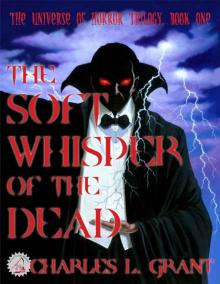 The Universe of Horror Volume 1: The Soft Whisper of the Dead (Neccon Classic Horror)
The Universe of Horror Volume 1: The Soft Whisper of the Dead (Neccon Classic Horror)![[Oxrun Station] Dialing The Wind Read online](http://i1.bookreadfree.com/i/03/19/oxrun_station_dialing_the_wind_preview.jpg) [Oxrun Station] Dialing The Wind
[Oxrun Station] Dialing The Wind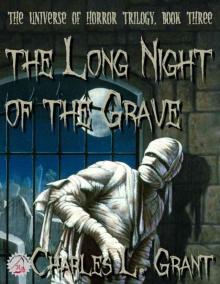 The Universe of Horror Volume 3: The Long Night of the Grave (Neccon Classic Horror)
The Universe of Horror Volume 3: The Long Night of the Grave (Neccon Classic Horror)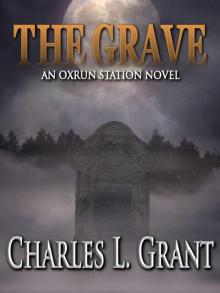 The Grave - An Oxrun Station Novel (Oxrun Station Novels)
The Grave - An Oxrun Station Novel (Oxrun Station Novels)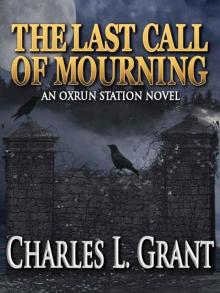 The Last Call of Mourning - An Oxrun Station Novel (Oxrun Station Novels)
The Last Call of Mourning - An Oxrun Station Novel (Oxrun Station Novels)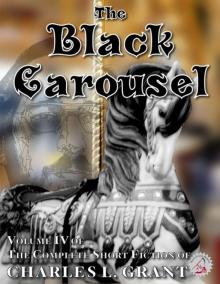 The Complete Short Fiction of Charles L. Grant, Volume IV: The Black Carousel
The Complete Short Fiction of Charles L. Grant, Volume IV: The Black Carousel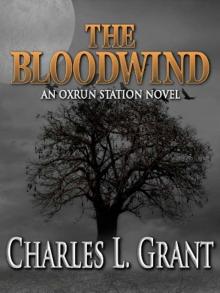 The Bloodwind - An Oxrun Station Novel (Oxrun Station Novels)
The Bloodwind - An Oxrun Station Novel (Oxrun Station Novels)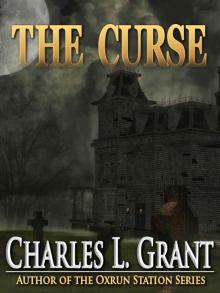 The Curse
The Curse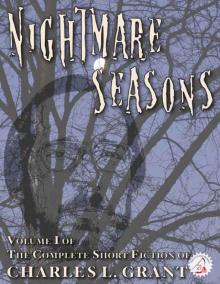 The Complete Short Fiction of Charles L. Grant Volume 1: Nightmare Seasons (Necon Classic Horror)
The Complete Short Fiction of Charles L. Grant Volume 1: Nightmare Seasons (Necon Classic Horror)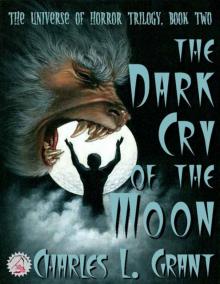 The Universe of Horror Volume 2: The Dark Cry of the Moon (Neccon Classic Horror)
The Universe of Horror Volume 2: The Dark Cry of the Moon (Neccon Classic Horror)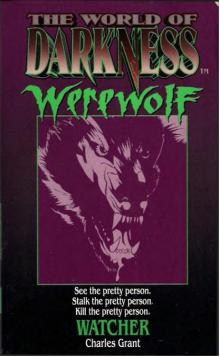 Watcher: Based on the Apocalypse (World of Darkness : Werewolf)
Watcher: Based on the Apocalypse (World of Darkness : Werewolf)![[Oxrun Station] The Bloodwind Read online](http://i1.bookreadfree.com/i/03/25/oxrun_station_the_bloodwind_preview.jpg) [Oxrun Station] The Bloodwind
[Oxrun Station] The Bloodwind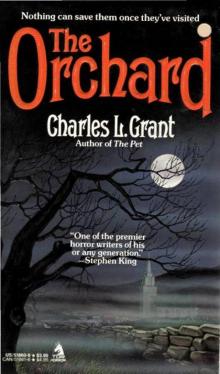 The Orchard
The Orchard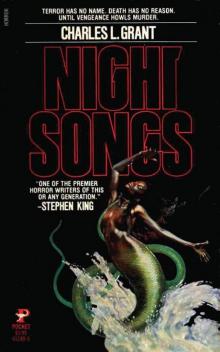 Night Songs
Night Songs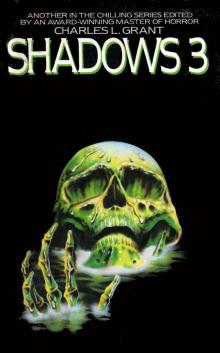 Shadows 3
Shadows 3![Symphony - [Millennium Quartet 01] Read online](http://i1.bookreadfree.com/i1/04/02/symphony_-_millennium_quartet_01_preview.jpg) Symphony - [Millennium Quartet 01]
Symphony - [Millennium Quartet 01] The Hour of the Oxrun Dead (Necon Classic Horror)
The Hour of the Oxrun Dead (Necon Classic Horror)![In the Mood - [Millennium Quartet 02] Read online](http://i1.bookreadfree.com/i1/03/31/in_the_mood_-_millennium_quartet_02_preview.jpg) In the Mood - [Millennium Quartet 02]
In the Mood - [Millennium Quartet 02] The Complete Short Fiction of Charles L. Grant Volume 3: Dialing the Wind (Neccon Classic Horror)
The Complete Short Fiction of Charles L. Grant Volume 3: Dialing the Wind (Neccon Classic Horror)![[Oxrun Station] The Last Call of Mourning Read online](http://i1.bookreadfree.com/i2/04/05/oxrun_station_the_last_call_of_mourning_preview.jpg) [Oxrun Station] The Last Call of Mourning
[Oxrun Station] The Last Call of Mourning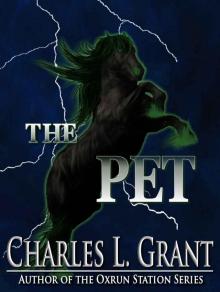 The Pet
The Pet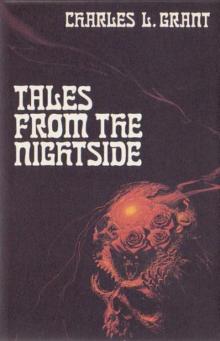 Tales from the Nightside
Tales from the Nightside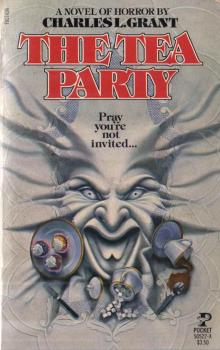 The Tea Party - A Novel of Horror
The Tea Party - A Novel of Horror The Complete Short Fiction of Charles L. Grant Volume 2: The Orchard (Necon Classic Horror)
The Complete Short Fiction of Charles L. Grant Volume 2: The Orchard (Necon Classic Horror) Whirlwind
Whirlwind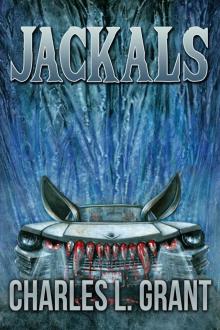 Jackals
Jackals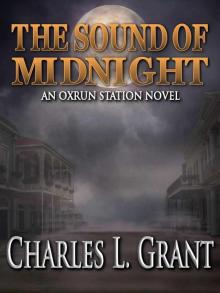 The Sound of Midnight - An Oxrun Station Novel
The Sound of Midnight - An Oxrun Station Novel